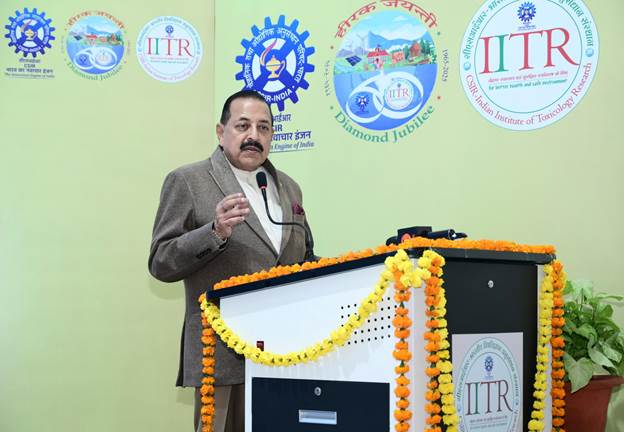NewzVille Desk
“Institutes like these don’t often make headlines unless linked to a crisis. It’s time for a proactive approach to showcase their contributions,” Science and Technology Minister Dr Jitendra Singh said this on 28 January 2025, while addressing a gathering at the 60th anniversary of the CSIR-Indian Institute of Toxicology Research (CSIR-IITR) in Lucknow.
He lauded some of the institute’s milestone achievements which have established its credibility and trustworthiness across the country as possibly the only institution of its kind in India and perhaps one of the few of its kind in the world.
Dr Jitendra Singh also placed on record the institute’s appreciable contribution in investigating the cause of the mysterious disease currently making news from the Rajouri district of Jammu & Kashmir.
The Minister lauded the institute’s pivotal role in addressing public health challenges and called for its expanded reach to ensure a “toxin-free India” by 2047, aligning with the vision of Viksit Bharat.
The Minister emphasized the institute’s support for startups and MSMEs through initiatives like the DSIR-CRTDH Environmental Monitoring Hub and BIRAC-BioNEST. With more than 30 startups and 55 MSMEs receiving support, CSIR-IITR is fostering innovation and entrepreneurship in sectors like environmental monitoring and pollution abatement.
The Minister stressed the need for wider visibility of the institute’s work, urging modern outreach strategies, including leveraging social media, to connect with stakeholders and the public.
Underlining the significance of synergy, Dr. Jitendra Singh proposed greater collaboration between CSIR-IITR and like-minded institutions, including IITs and medical research centres, to foster a holistic approach to science and innovation. He also celebrated the institute’s support for over 30 startups and 50 MSMEs, highlighting its contribution to India’s bio-economy.
As part of the Diamond Jubilee Celebrations, Dr. Jitendra Singh inaugurated several key facilities at CSIR-IITR, strengthening its research and innovation capabilities. These included the Diamond Jubilee Arches, the new Diamond Jubilee Block, the NaMo-ATAL facility, and VV Sansa—an advanced reference material facility.
Additionally, the Minister inaugurated the third-floor TDIC, the operational hub of the BioNEST initiative, aimed at fostering biotech startups and research collaborations.The Minister toured the CSIR-IITR Exhibition, which showcased the institute’s latest research breakthroughs and technological innovations.
Dr. Jitendra Singh also unveiled a commemorative stamp highlighting the institute’s remarkable journey. Among the major product launches were Apatkaleen AHAAR, a shelf-stable, high-nutrition food solution for disaster relief and emergency preparedness, and NFit: Nutritious Food in Tablets, a compact superfood designed for endurance and cognitive performance in extreme environments, including space travel.
Another innovation, MIL-FiT: Millet-enriched All-in-One Tablets, offers a high-fibre, protein-rich food solution for trekkers, adventurers, and field personnel operating in remote locations. Additionally, SenzSCAn: Point-of-Care Chromogenic Sensor for Sickle Cell Anaemia was introduced—a cost-effective and portable diagnostic tool enabling rapid detection of sickle cell anaemia, particularly in underserved regions.
The event also witnessed the launch of the WARMEST and EARTH-25 conferences, aimed at fostering research collaboration on environmental and health challenges, along with the Diamond Jubilee Internship and the E-PARAM initiative, promoting skill development and digital transformation.





